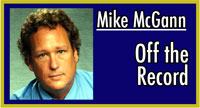School board, teachers failing to make coherent public case in labor talks
By Mike McGann, Editor, UnionvilleTimes.com
 I’m sure, somewhere, there’s a self-help book called “When good people make bad decisions.” If so, I’d kind of appreciate it if someone would send a crate here to Unionville.
I’m sure, somewhere, there’s a self-help book called “When good people make bad decisions.” If so, I’d kind of appreciate it if someone would send a crate here to Unionville.
The latest wrangling by the school board and the teachers’ union is a case in point — and neither side is really covering themselves in glory in recent days, after weeks of what seemed like productive talks. As a former political operative, I can suggest of late, both sides have given a virtual clinic on how not to frame their message.
The ticky-tacky complaints by some of the union negotiators — granted, they were made months ago — built up animosity in what is generally a “no autopsy, no foul” labor negotiation process. The choice not to participate in some optional activities, such as elementary school talent shows, generated anger among parents and reduced public sympathy for their side, a pool already dwindled by the perception that their salary demands are out of whack with financial realities.
 On the other side, I get that the teachers’ pension thing is kind of a mess. But…the wailing is a little out of perspective to the problem and quite frankly, the cause.
On the other side, I get that the teachers’ pension thing is kind of a mess. But…the wailing is a little out of perspective to the problem and quite frankly, the cause.
Let’s talk about the cause, which has been spun and spun and spun to an extent that it appears that somehow the teachers are the bad guys here.
Way back in 2001, just as the boom was ending, and stock prices peaked, the state legislature opted to pass a bill to both increase its own pensions, and change the vesting rules for teachers and other public employees while cutting local and state pension contributions, which, in theory would lead to lower property taxes. Like the vast, vast majority of Pennsylvania’s school boards, Unionville’s neither lowered property taxes, nor put money away against future pension liabilities.
In hindsight, which is always 20-20, it was a bit like finding your credit card company had lowered your minimum payment and celebrating it by buying a new, pricey flat screen TV. Meanwhile, as the district only had to put in 1% or 2% of salaries, teachers kept paying generally more than 7%. Over the next decade, the district’s rate increased slowly, but even now, after three years of financial crisis, the district has not had to fully match the teachers’ payments.
That seems likely to change, as has happened with so many overstuffed credit cards and balloon mortgages, and now the bill is due. Somehow, in all this as the Public School Employees Pension System boogieman keeps getting trotted out, the teachers are somehow being portrayed as the villains. Yes, PSERS is a problem, but one created by the state legislature, aided and abetted by schools districts and school boards.
Instead of the teachers, our two local state representatives, Steve Barrar and Chris Ross, both of whom voted to change the pension rules and both of whom admit things did not work out they way their expected, ought to be getting the heat over pensions, not the teachers, who to my mind, are the only innocent party here, at least when it comes to their pensions. They played by the rules — not rules they made, mind you — and paid their share all along. The state and the school district could have been more responsible and weren’t. Pointing fingers at the only innocent party does the board no credit.
And maybe worse, the PSERS hysteria is totally outstripping the really scary issue: health care costs. While the PSERS mess amounts to a couple Starbucks lattes a year for the average property owner in tax difference between the current district and teachers contract proposals (and yes, in theory, the rate is expected to increase — but as the cash-strapped state has to pay half and has repeatedly shown a gift for stalling and keeping the rates down, you have to taker those projections with a grain of salt), the difference on health care is a mile wide, as in more than $1 million over the next two school years.
There’s no question that the Personal Choice health plan is better than the Keystone Direct plan. I know, I have it. It also costs my family just under $2,000 a month to have it — a choice we made and we pay for. It’s a BMW, if you will, and when times were good, a nice perk. But these times aren’t good and the district is offering a solid Ford plan with the option for the teachers to upgrade to the better plan out of pocket.
And to be honest, back in the boom times, when I was working for a Fortune 500 publishing mega-corporation as executive editor of a national magazine, even then, I had to pay to upgrade for the best health care insurance and paid a higher percentage than the teachers are being asked to foot now. In the private sector, it’s been that way for a while, and it’s fair to ask public employees to carry the same burden.
I’m on the same page on compensation. Even though both sides have narrowed their differences, the district’s offer is closer to financial reality, now that the step issue — trying a radical half-step seniority plan — has wisely been set aside. The governor’s call for a teacher wage freeze doesn’t give the union much wiggle room — especially as the administrators have taken a wage freeze for the second straight year (yes, I know the administrators make a lot more money, and in truth can better afford it).
In a perfect world, I think, we’d give the teachers all they ask for in terms of compensation. But this world is far from perfect — and while PSERS is a bit of a boogieman, real estate tax revenue fall offs, health care and looming debt service on capital projects (the 800-pound gorilla no one seems to want to talk about) could prove to be the iceberg to this Titanic of a district. As it’s a cinch that legislation will pass in Harrisburg allowing districts to lay off teachers for fiscal cause, a 3% pay hike now might lead to a 100% cut for some teachers in a couple of years — a hit that will hurt not just them, but students who will see larger class sizes and less options.
Yet, if I’m a teacher, I might take pause to buy that argument after the Board of Education’s seeming inclination not to raise taxes to the Act 1 limit. Surely, if there’s a $1.1 Million deficit, courtesy Gov. Corbett, the board seems to have decided not to ask for $213,000 in additional property tax revenue — about $20 bucks in taxes for the average property owner. If things are so financially desperate, why give cover to the governor on his pass-through tax hike?
At best, it’s a mixed message, but one that muddies the water, much as the PSERS issue and begs the question of whether this truly about money or…wait for it…politics. I’d really like to think it’s about money and some exceptionally poor messaging (a Unionville-Chadds Ford School District tradition), but you have to wonder.








This is the most fair fact filled article I have seen about the PSERS issue. You have continued to give a fair account of a difficult negotiating time for our students and community. We have never had so much ill will between the board-community and teachers. I hope it is settled soon. $20 per home, give me a break, write the check.